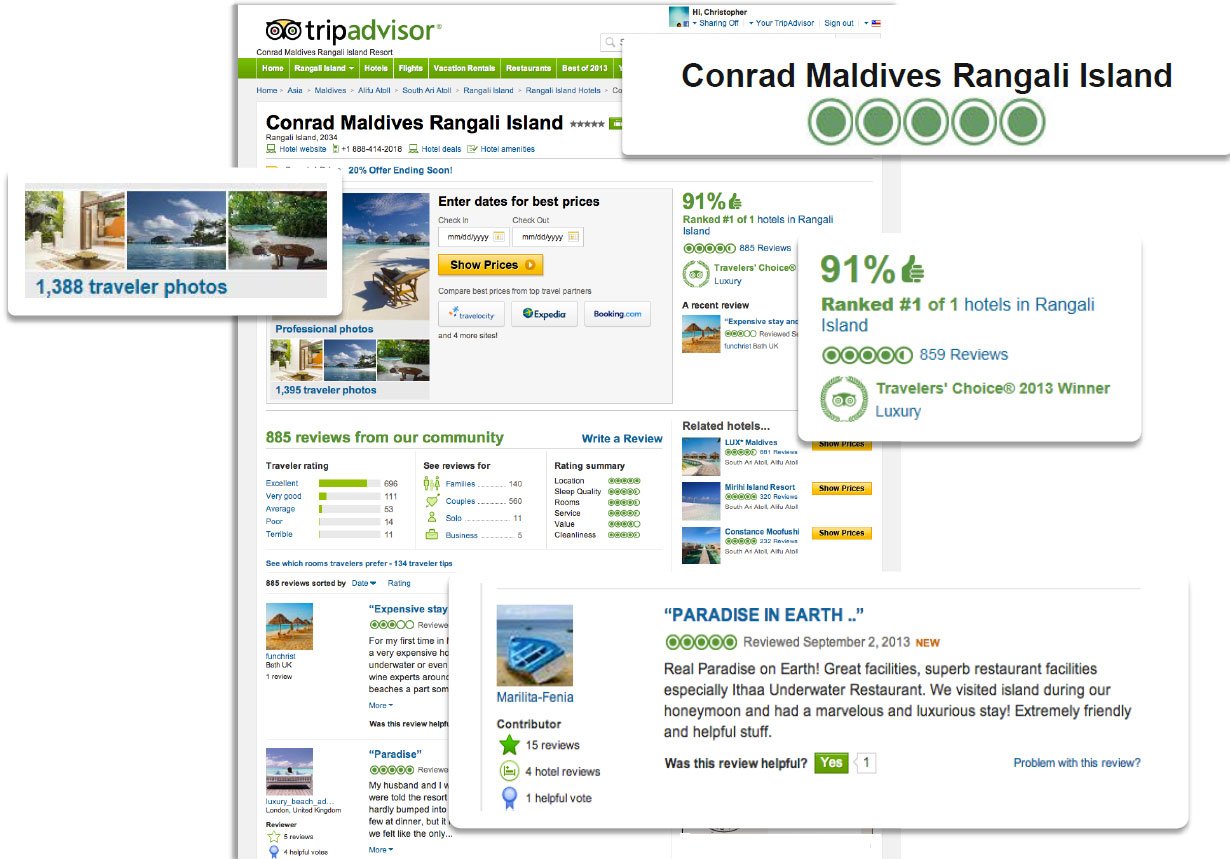The following article is exclusive content from The Motley Fool. While this is typically paid content, we are bringing it to you free because we think it is especially pertinent to your ability to invest wisely.
During the past few years, TripAdvisor (TRIP 1.73%) has been on a tear. The stock has more than doubled, far outpacing the market, but it still has plenty of room to run in the online travel advertising market. The company, founded by CEO Stephen Kaufer in 2000, was a first mover in its niche, and it has grown into the world's largest online travel website. It should benefit from multiple megatrends. Including the growth of online advertising and the shift to online travel booking -- and its rich database of content and large user base should provide a durable competitive advantage.
1. Top Dog and First Mover
In the primitive days of the Internet (or, the end of the 1990s), Stephen Kaufer was planning a trip to Mexico with his wife. He visited a travel agent and collected brochures for three hotels. Of course, the brochures weren't very helpful, so Kaufer went online for more information. The information available there wasn't very helpful, either -- most websites were just a rehash of the pictures and text in the brochures.
Not wanting to make an uninformed decision about his vacation, Kaufer dug deeper into the Web, searching for better information. In addition to being slightly obsessed, Kaufer was also a Harvard-trained software engineer. He applied Boolean logic to his search, and he eventually found a personal website that provided the most useful and unbiased information. That helped Kaufer make a good decision for his vacation and, in 2000, Kaufer founded TripAdvisor -- at his wife's urging -- to help others make better decisions about their own travel. This was three years before Wikitravel was founded, and four years before Yelp.
With that head start and Kaufer's relentless efforts, TripAdvisor is now the No. 1 travel site on the Internet. In 2013, TripAdvisor boasted more than 260 million monthly unique visitors, which is 11% of the global total for online travel.
Source: TripAdvisor
2. Massive Opportunity in an important, emerging industry
Global travel and travel advertising are huge industries in the midst of a major technological disruption. Travel bookings and advertising are rapidly moving online and, despite sustained growth for more than a decade, online travel booking and advertising represent just a small fraction of the total market. This megatrend toward online travel (and online travel advertising) should fuel TripAdvisor's growth for years.
Travel is a huge industry -- more than $6 trillion is spent annually on travel, according to estimates from BI Intelligence. To attract that huge global opportunity, travel-related businesses need to advertise. According to researcher IDC, the global market for travel advertising will be $51 billion in 2016, with about a quarter of that spent online (about $13 billion). To put that in context, TripAdvisor generated $944 million in 2013 -- so even as the leading travel website, TripAdvisor is still attracting only a small piece of that total ad spending.
The travel advertising market is not only huge, but also growing -- particularly online. In 2011, IDC pegged total travel advertising spending at $39 billion, with 16% ($6 billion) spent online. That makes IDC's 2016 projection for online travel ad spending more than 16% annual growth.
But you don't have to trust the projections of the industry research analyst. You can simply look at the recent trends in online travel booking. Priceline.com and Expedia are two of the world's largest travel-booking sites -- and TripAdvisor's largest customers. The two companies' revenues have increased 30% and 16%, respectively, annually during the past three years. Clearly, people are increasingly booking travel online, which necessitates increasing spending in online travel advertising -- to the benefit of TripAdvisor, whose revenue has increased 25% annually during the same time.
3. Hugely Valuable Intangible Asset
TripAdvisor has built a rich database of user-generated travel reviews. Its website features more than 150 million reviews of more than 3.7 million accommodations, restaurants, and attractions. According to a survey by PhoCusWright, 83% of travelers feel more confident in their travel decisions after reading TripAdvisor reviews. That draws TripAdvisor's huge user base of more than 260 million unique visitors per month; that's more than Twitter (241 million) and Yelp (120 million).

This combination of a massive database and a huge user base is the source of TripAdvisor's durable competitive advantage. It creates a network effect as the biggest database of travel-related reviews, and gets the most traffic. And more traffic results in more reviews, which increases traffic, which leads to more reviews, and away we go. This virtuous circle between the database and unique monthly visitors isn't just a theory -- you can see the pattern in the data. Traffic continues to increase (it was up 50% in the fourth quarter), and during the past year, TripAdvisor's database of reviews increased from 100 million to 150 million.
There's also circularity between advertisers and traffic. More traffic leads to more ad revenue for TripAdvisor, which enables TripAdvisor to spend more to improve its website and user experience, which leads to more traffic, more advertising revenue, and more money to spend on its site.
The Foolish Bottom Line
TripAdvisor has created an unparalleled database of travel information, and a huge base of loyal users that would be nearly impossible for a competitor to replicate. As travel bookings and travel advertising increasingly move online, TripAdvisor is in the right place to benefit.






